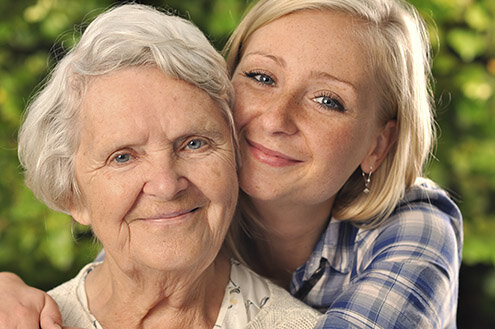Whether as caregivers or those diagnosed, dementia takes toll on women
by Lonna Whiting for Inforum:
In 2014, I took an estimated 40 hours of paid time off to care for a dependent.
Many working parents can probably relate. Managing someone else's doctor appointments, special events, paperwork and various meetings takes time out of work—not to mention the time it takes to care for your own needs.
But this is 2015, and while it's practically expected that parents—women in particular—can take time off to care for a child, it's not always expected or accepted to take time off to care for an elder.
I, for example, don't have children. I'm not a foster parent. I have a mother with dementia who relies on me to facilitate her health care and financial assistance.
Not too long ago, mom was complaining about not being able to "go" to the bathroom because it hurt. Common in people with dementia, I suspected right away that she had a urinary tract infection.
What would have likely been a quick, 45-minute consult at a walk-in clinic for a cognitively healthy person took us more than three hours, two of them locked in the bathroom trying to collect a urine sample. During that time, I took three hours of paid time off from my job, plus another 45 minutes to account for travel time. That's practically a half day's work.
Like having children, I take care to make sure that she is safe, happy and healthy. Much as I imagine life is like as a mother, most of the responsibility is quite rewarding and makes me a better, more patient person.
Unlike being a mother, however, caregivers like me are parents in reverse—we don't help someone grow up; we help them die with grace and dignity.
Right smack dab in the middle of the caregiving experience? Women. According to "The Shriver Report, A Study by Maria Shriver and the Alzheimer's Association," my situation is hardly unique. A section in the report, "A Woman's Nation takes on Alzheimer's," reports that 3.3 million American women are living with Alzheimer's and another 6.7 million are caring for someone with the disease.
In an era when more women are the primary breadwinners in families, they're clearly on the losing end when it comes to the dismal financial, social, psychological and spiritual support available when they become dementia victims or caregivers. The report also states that "a third of women caregivers are caring 24/7 for a person with Alzheimer's. Nearly 40 percent say they had no choice in becoming a caregiver."
Choice or no, the fact that caregivers provided an estimated 17 billion hours of unpaid care to a dependent with dementia in 2014 alone, and that 60 percent of the cost of that care comes from families, means caregiving is a full-time job—sometimes one that requires being on the clock 24/7. Sixty-five percent of caregivers like me, who have careers, are forced to take time off and make up for lost hours in the evenings as a result of their caregiving responsibilities.
As I write this, the facility nurse called to tell me Mom has been having severe abdominal pain and she should probably go to the doctor. I just started a new job, and paid time off doesn't kick in for months. So I'm forced to make a decision—get mom to the doctor now and work later or let mom suffer until I have time for her? Neither seem fair to either of us.
A commentary on Shriver's report sums it up well: "Women are in the midst of an even more far-reaching transformation in which they work, raise kids, care for the elderly (and) drive consumer decisions."
I don't find any positive transformation in situations where women must prioritize among responsibilities, love and devotion. In fact, it seems that in an era when dementia and Alzheimer's are beginning to transform a helicopter generation, women's rights are being compromised.
Until we get the funds needed to back research that will discover efficacious treatments for Alzheimer's and dementia, we lose on all fronts.
As it turns out, a healthy dose of Alka-Seltzer did the trick on mom's stomach pain. My quick trip to Walgreens and a big hug made things all better for her. In many ways, as much as dementia has taken away my freedoms as a 30-something American woman, I've also gained an understanding of how empowering it can be to ensure a loved one's basic human needs are met. Nothing can take that away.

